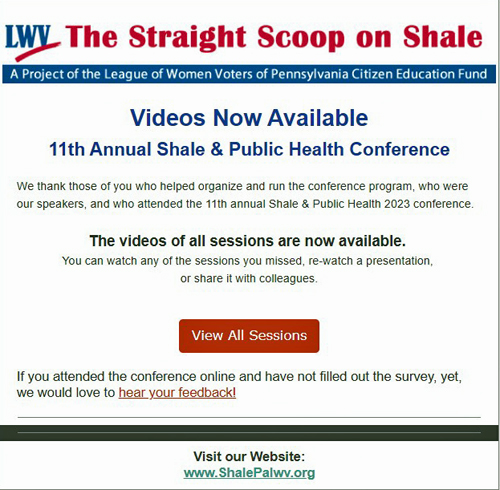
YouTube Playlist:
If you only watch one of the 14 videos from the conference, I recommend video #8 with Justin Nobel.
20:54 Min Welcome to the 11th Annual LWV Shale and Public Health Conference
15:37 Min Exploring Risk Factors of human exposure to environmental risk factors.
22:37 Min Exploring Risk Factors of human exposure to environmental risk factors.
7:03 Min Exploring Risk Factors of human exposure to environmental risk factors.
18:07 Q & A Session: Shale & Public Health Conference
21:00 Birth Impacts
24:33 Min Radiation & Waste
#8. 21:28 Min: Radiation & Waste ![]() MUST WATCH by Justin Nobel, notably if you are an oil and gas worker anywhere in the world, and or if you live in a frac field where frac’ers like Encana/Ovintiv spray their radioactive waste on foodlands on windy days so you get to breath it in as well as get it in your drinking water via run off.
MUST WATCH by Justin Nobel, notably if you are an oil and gas worker anywhere in the world, and or if you live in a frac field where frac’ers like Encana/Ovintiv spray their radioactive waste on foodlands on windy days so you get to breath it in as well as get it in your drinking water via run off.![]()
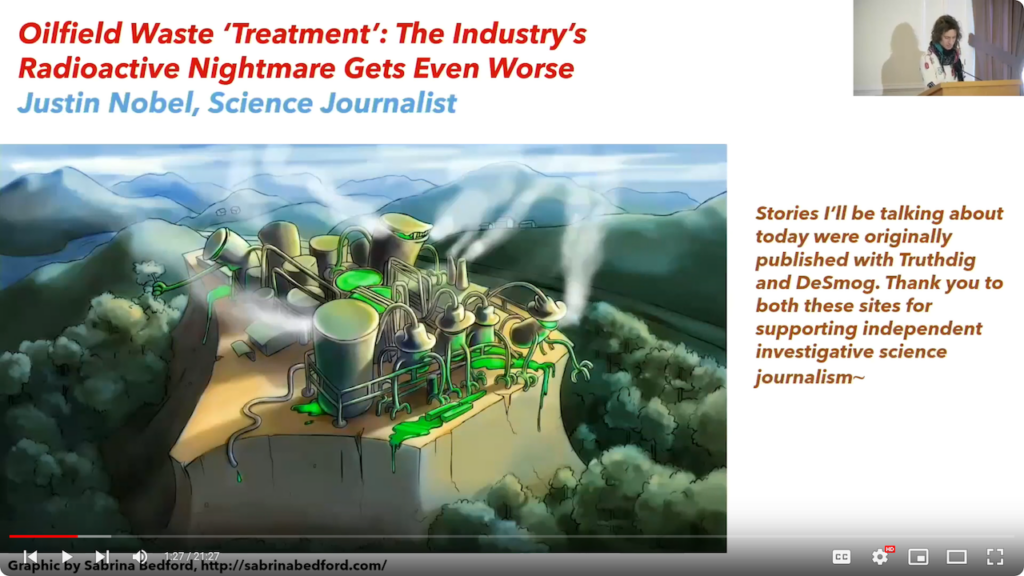
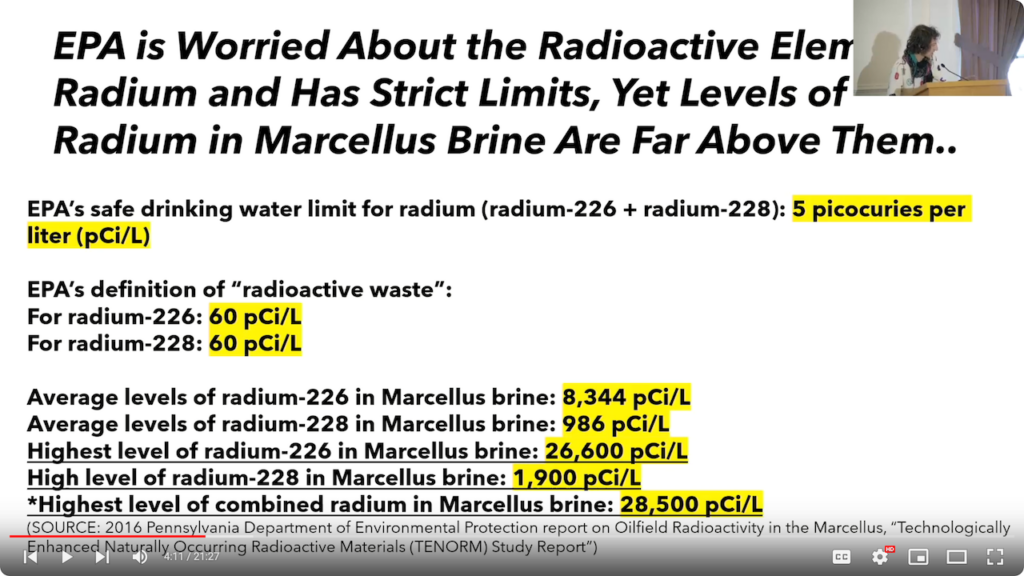
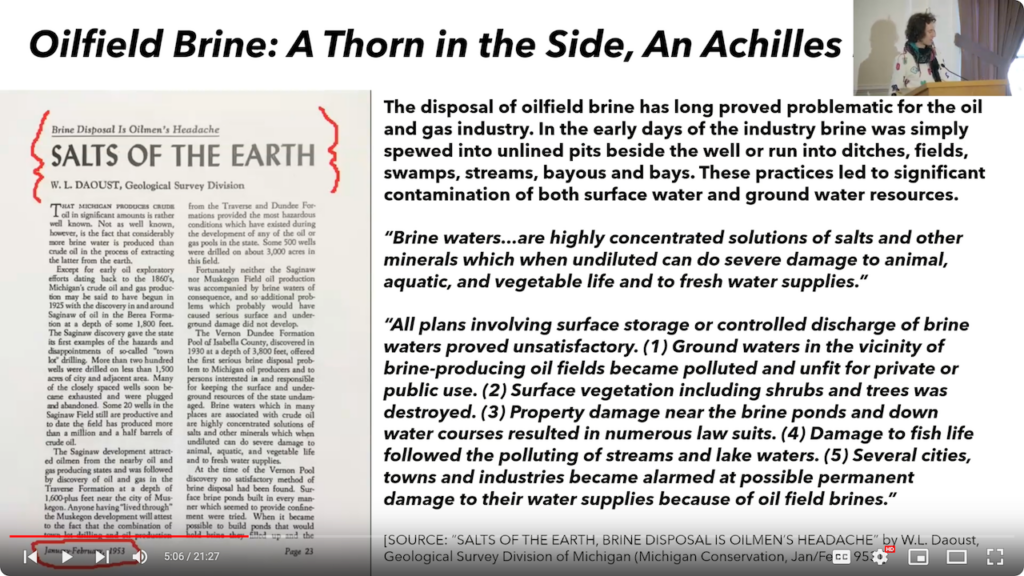
“This site maxed out his geiger counter.”
“‘These are the hottest samples I’ve ever worked with in the field,’ says [Dr. Yuri] Gorby”
![]() Oil, gas, bitumen and frac companies and their enablers (politicos and our so called regulators) have known for decades that the industry regularly contaminates groundwater and citizen and municipal drinking water supplies (and soil, air, food, etc), yet, decades ago when I began speaking publicly about Encana’s crimes, and then later went public with my lawsuit, AER, Alberta gov’t, CAPP et al, politicians and media of all stripes loudly insisted there has never been groundwater anywhere in the world contaminated by the oil and gas industry.
Oil, gas, bitumen and frac companies and their enablers (politicos and our so called regulators) have known for decades that the industry regularly contaminates groundwater and citizen and municipal drinking water supplies (and soil, air, food, etc), yet, decades ago when I began speaking publicly about Encana’s crimes, and then later went public with my lawsuit, AER, Alberta gov’t, CAPP et al, politicians and media of all stripes loudly insisted there has never been groundwater anywhere in the world contaminated by the oil and gas industry.![]()
Justin Nobel’s last slide, cover of and quotes from 1982 Official gov’t report:
- “Any control methodology proposed for radioactive materials must recognize the fact that radioactivity can not be modified or made inert by chemical means. It also must recognize that radioactivity dissipates at fixed rates through fixed sequences or series. Decay to daughter products cannot be guaranteed to reduce the hazard…”
- Any attempt to remove radioactivity is merely transforming, quote, “a very dilute source of radioactive materials into a very concentrated source of radioactivity.”
- “Radium 226 is a potent source of radiation exposure, both internal and external…Radon 222 and its daughters cause the most severe impact to public health.”
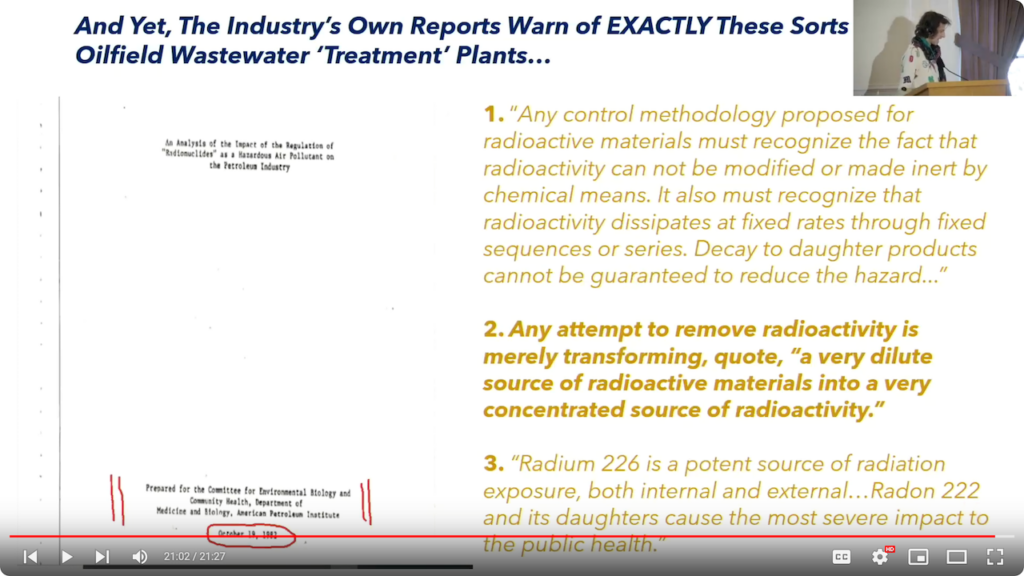
12:13 Min Questions & Answers ![]() ALSO A MUST WATCH.
ALSO A MUST WATCH.![]()
***
31:29 Min: 9th Compendium of Scientific, Medical, and Media Findings
41:32 Min: Fracking and Water Contaminates
47:51 Min: Abandoned Wells
22:56 Min: PFAS Use in Shale Gas Development
1:01:11 Min: Panel Discussion: Blue Hydrogen
***
Former Employees of Eureka Resources Oil & Gas Wastewater Treatment Company ask for Criminal Investigation of Eureka and an Audit Of DEP over Alleged Workplace, Environmental Violations by David Hess, Dec 12, 2023. PA Environment Digest Blog
On December 11, former employees of the Eureka Resources oil and gas wastewater treatment company based in Williamsport wrote a letter to Lycoming County District Attorney Ryan Gardner requesting him to undertake a “criminal misconduct” investigation of alleged workplace and environmental violations by the company.
They also requested an “internal audit” of the Department of Environmental Protection, the Wilkes-Barre OSHA Office, and the Williamsport Bureau of Codes for “willful neglect related to these matters.”
Click Here for a copy of the letter.
The request for the investigation was made during a press briefing attended by two former employees of Eureka– Eric Steppe and Quinn Aughenbaugh– organized by Sen. Katie Muth (D-Chester) and also attended by Rep. Christopher Rabb (D-Philadelphia) and Rep. Danielle Friel Otten (D-Chester).
Alison Steele, Executive Director of the Environmental Health Project, provided comments on the gaps in health and safety regulation to protect oil and gas industry workers and the public.
Click Here to watch a video of the press briefing.
The briefing was based on a December 10 Public Herald podcast and article sharing the experiences of five workers– Eric Steppe, Quinn Aughenbaugh, Brandon Barrett, Dalton Trahan and Alijah Kibler– who worked with radioactive oil and gas wastewater at the Eureka Resources wastewater treatment plant in Williamsport.
In the article, Eric Steppe related his experience cleaning up multiple spills at the plant and having to be taken to the hospital as a result of his exposure to oil and gas wastewater being treated at the plant.
Click Here to listen to the podcast and read the entire article.
Opening Remarks
Sen. Muth opened the briefing by saying, “I’m honored to stand here today with two of several brave workers that have come forward to talk about the horrific working conditions they were subject to as former workers of a fracking wastewater treatment facility in Williamsport called Eureka Resources and honored to partner with Public Herald, Josh Pribanic, Melissa Troutman, all of the investigative journalists who have put in their time and effort to really continue the coverage on this issue.
“This is many years in the making that public Herald has done intense research getting right to know request data from the various regulators that are supposed to ensure accountability and safety, showing that Pennsylvania’s oil and gas industry has a radioactive problem that is not just toxic to the public and our waterways and our soil and air, but also to workers who are often rarely informed about the working conditions that they are in day to day.
“Again, this is a very controversial, for some, issue in this building as a bipartisan love affair has existed for the oil and gas petrochemical industry in Pennsylvania for many, many years.
“I think the one thing, regardless of how you feel about fracking or chemical manufacturing or any kind of fossil fuel energy extraction, is that the harm that happens to the public and the workers has to stop,” said Sen. Muth.
Let Me Paint You A Picture
Eric Steppe, a former Eureka employee who said he was fired on his first day back to work after being off a month recovering from a workplace injury, described one of several incidents that happened at the Williamsport facility where he worked for eight months.
“I’d like to give you guys, paint you a picture of one of our experiences at Eureka Resources.
“So we have these pits there. They’re 12 feet deep. There’s four of them. 1, 2, 3, 4.
“They’re constantly filled to the very lip of the top of the pit with frack water. And in that frack water is all these terrible things that I’ve been describing to you so far.
“So as they’re sitting there, all the nasty stuff eventually sinks to the bottom and builds sludge. Sludge which Quinn and I have seen in person.
“So at the bottom of this pit, they drained it because they wanted to put a lid over it and they got all the frack water out of it. And what was left was about three feet of this toxic sludge containing H2S [hydrogen sulfide] gas for one.
“And a former coworker of mine who’s no longer at Eureka put his gear on. He had a mask on. He had a full face mask, a breather. He had gloves and boots. He had a Tyvek suit, and he was asked to go down into that pit to, at first, he was going to have to fill the sludge into buckets and pull it out with a rope.
“But then they changed the idea that they were going to get a vacuum [hose] down there and suck the sludge out. So my coworker, Dalton Trahan and I were standing on the catwalk above this pit.
“Now visualize this. There’s a broken hand crank winch to hook to a person’s harness. It’s supposed to be safe, to get them in and out of the pit.
“This was broken. And even if it was in the correct position, which it wasn’t… So if the pit’s right here, there’s girders across the top of the pit, the winch was on top of the girders so that if you hook it to a person that’s 12 feet down in this pit of hell, how are they supposed to get the guy up out of the pit?
“You can’t. You can only get them to the top of the girders right here.
“So what was Eureka’s solution? Their solution was get a rope ladder, use a rope ladder, which still didn’t come up out of the pit. It only came to the top of the girders.
“So my coworker’s down there, he’s being spotted by me and Dalton Trahan
“He’s like, “Guys, I can’t take anymore.” His eyes boom like this and he’s lightheaded. He’s starting to feel woozy.
“So we’re like, get him out of there. Get him out of there.
“This guy who is well over 200 pounds climbs up this oil and sludge covered rope ladder, and he gets to about, almost to the top of the rope ladder.
“He reaches up and he grabs a girder and he doesn’t have the strength to pull himself out.
“So Dalton and I grab him, two guys and Dalton’s a big guy.
“We grab our friend and we reef him out of there barely. It took everything the two of us had to get him out of there.
“If it wasn’t for us, I don’t know how they would’ve got him out of there.
“By the time EMS or a rescue team would’ve got in there to help him, it would’ve been too late because I’m going to tell you this, we were standing above that pit and just from him sucking up the sludge, everything that was released that was trapped in that sludge came up and hit Dalton and I.
“And the two of us were getting sick and we were 12 feet above that thing. Imagine how my friend was down in it, even though he had all his gear on, it still permeated him and affected him drastically.
“So yeah, I hope that gives you a visual.
“When, and Quinn was a part of this, after this, they wanted us to go back in there because we couldn’t finish the job. They wanted us to go down in there and do it again.
“We refused. We filed a stop work clause. At that time, our plant manager comes out and he mocks us as a group and he stands there in front of us and he calls us puss–s.
“He says, “I don’t feel safe. I don’t feel safe. I don’t want to go do my job because I don’t have the balls to go do it.”
“That’s what we were confronted with. Did not once show an ounce of concern for the safety of his employees.
“As my buddy sat there, after he got out of that pit and he just was glazed over, covered in filth and sludge and toxicity, didn’t even care. He did not care.
“Instead, he [plant manager] just wanted to belittle us and make us feel incompetent and like absolute crap.”
Later in response to media questions, Steppe said, “Nothing was done [about violations] until I got a hold of Rep. [Jamie] Flick’s [R-Lycoming] office and told them what was going on.
“Then all of a sudden OSHA’s in there flashing badges and interrogating people. But they went off of their word, our plant manager’s word, alone.
“So they sent him a list, said these all need to be corrected based on the complaint that we got. They posted it up.
“None of it was corrected.”
Radiation In Oil & Gas Wastewater
A study released in May 2022 by Penn State University found conventional drilling wastewater spread on roads in Pennsylvania contains concentrations of barium, strontium, lithium, iron, manganese that exceed human-health based criteria and levels of radioactive radium that exceed industrial discharge standards. Read more here.
In fact, 25 out of the 31 chemicals and pollutants found in the wastewater exceeded, and in many instances far exceeded, established health or environmental standards, including radioactive radium. Read more here.
“Combined radium activities in the three OGPWs when applied to the roadbeds ranged from 84 to 2,500 pCi/L, within the anticipated range for OGPWs from western Pennsylvania. Combined radium activities in runoff from the OGPW-treated roadbeds exceeded 60 pCi/L, the effluent standard for industrial wastewater discharges.” Read more here.
On September 29, DEP told the Low-Level Waste Advisory Committee shale gas operations in Pennsylvania sent 138,336 cubic feet of radioactive TENORM (Technically Enhanced Naturally Occurring Radioactive Material) waste to the Waste Control Specialists low-level radioactive waste facility in Texas for disposal. Read more here.
That amount is down from the 236,150 cubic feet of TENORM sent in 2021. Read more here.
From 2017 to 2022, shale gas operators sent a total of 911,006 cubic feet of radioactive TENORM waste to low-level radioactive waste facilities for disposal. Read more here.
There’s Oil In The Distillate
Steppe continued, “I’m going to end with this.
“I am aware of waters in the Commonwealth that have been polluted by Eureka Resources. I have seen it. I have seen oil in the distillate because that was one of the things that we tested on a daily basis, multiple times a day.
“Hey boss, I got a beaker in my hand. Why is there oil in this distilled water? Which they said we could drink. Smells like there’s all kinds of bad stuff in it. It doesn’t smell like distilled water to me.
“They would say to us, “Well, you could drink it, but I don’t recommend it.”
“So I went into his office and I showed him this beaker and it looked like somebody dumped canola oil in it.
“He said, “Don’t you ever talk about oil being in the distillate. We don’t talk about that.” I said, “What do you mean it’s right here? I test it every time I go and do my rounds. I test this water. There’s oil in it in two different spots where we test it.”
“There’s always going to be oil in the distillate,” he said, “We don’t talk about that. Keep your mouth shut.”
“That’s what I was told. He also asked me to put my phone on the desk because “people have a tendency to record things around here.”
“I’m angry.” said Steppe.
List Of Demands
Eric Steppe read from a letter he and his coworkers sent to Lycoming County District Attorney Ryan Gardner December 11 requesting a “criminal misconduct” investigation of Eureka Resources and an “internal audit” of Department of Environmental Protection, the Wilkes-Barre OSHA office and the Williamsport Bureau of Codes for “willful neglect” related to alleged workplace and environmental violations at Eureka.
“Over the past year, we have experienced working in an unsafe work environment. We have been subjected to continual gas inhalation, methanol byproducts, carbon monoxide, H2S [hydrogen sulfide] gas, etc., radiation exposure, which has sickened several of the workers and constant exposure to poorly maintained, highly pressurized vessels containing hot gases and caustics.
“In 2022, a [Eureka Resources] WySox [plant] worker’s last several hours spent on this Earth was experiencing the most pain that any human could ever attempt to imagine as his skin was melted off his body.
“Think about that. Of what injuries were recorded and documented, a personal friend of mine, Brandon Barrett, was exposed to H2S [hydrogen sulfide] gas, became ill and disoriented.
“He had visibly blue lips that I saw with my own eyes and uncontrolled drooling during the event, and had to drive himself to the Urgent [Care Medical] Center to receive the immediate healthcare that he needed.
“Myself, Eric Steppe, was directly exposed to carbon monoxide gas and H2S gas. I became extremely ill and had to be driven to the UPMC ER [emergency room] for immediate healthcare needs.
“And I’d like to make a note that coincidentally, there is an appearance of impropriety and conflict of interest at the Williamsport Sanitary Authority, as a Eureka Resources LLC owner is the current vice chair of the board.
“Ain’t that convenient?
“And I want to ask everybody here. Do you know what it feels like to be all alone? That there is no one to have your backs, that there is no one in the government who will help?![]() Yes and Yes. I also know well what’s it’s like to be abused by the very gov’t and agencies we pay to protect us. And, I was abused by my own lawyers, after nearly $400,000.00 in legal and associated fees and courts costs.
Yes and Yes. I also know well what’s it’s like to be abused by the very gov’t and agencies we pay to protect us. And, I was abused by my own lawyers, after nearly $400,000.00 in legal and associated fees and courts costs.![]()
“Do you know what it feels like to be gaslit by the very government agencies you pay taxes to? ![]() Yes, I know it well.
Yes, I know it well.![]()
“That personally pisses me off.
“To be told there is nothing to see. Your concerns are an illusion. These issues and serious questions don’t matter.
“That is how we felt. Nothing happened. Nothing until an OSHA whistleblower complaint was actually filed with the [US] Department of Labor against OSHA.”
“This issue is urgent, as it exposes both private and public accountability issues, disenfranchises Pennsylvania workers in this overlooked labor segment, subjects workers and the public to substantive environmental hazards, and risks the lives of current and future workers and their families involved with Eureka Resources, LLC.
“Someone is likely to be severely maimed or killed in the future if the State does nothing, and we have sounded the alarm and notified all pertinent agencies, in writing, to this affect.”
He read a list of seven demands—
— “One, the tendered resignations of the Wilkes-Barre OSHA area manager and field inspector for, willful neglect and a perceived disdain for any health and safety whistleblower outlining numerous dangerous conditions surrounding this facility. This will attempt to restore the trust in this institution.
— “Two, freeze redevelopment capital program grant funding being provided to Eureka Resources LLC by the state as there have been over 16 OSHA safety complaints and violations recorded over the last eight years alone. And this historical performance should not be funded by the taxpayers.
— “Three, an RTKL [Right To Know Law] audit of the Williamsport Bureau of Codes to root out the willful neglect and violation of statutes, protecting the body politic and their right to transparency, particularly surrounding this facility.
— “Four, knowing the radiation that we are being exposed, to having badges and dosimeters to measure dangerous levels of radiation. And a plan for workers who are overexposed.
— “Five, stop the state from turning a blind eye to point source pollution, petroleum in the distillate water being exported from a facility to the Williamsport Sewer District and addressing that a Eureka Resources LLC owner sits on the water board creating yet another conflict of interest.
— “Six, assuring appropriate building and vessel ventilation and building code compliance to prevent methanol H2S, hydrogen chlorine gas exposure, and poisoning risks to Pennsylvania workers.
— “Seven, assure a full-time, full shift manager is present at all times in this overlooked labor segment that involves pressurized vessels, radiation, toxic gases, and caustics.”
The letter was signed by former Eureka Resources employees– Eric Steppe, Quinn Augenbaugh, Dalton Trehan and Brandon Barrett.
Click Here for a copy of the letter.
Comments By Rep. Rabb
Rep. Christopher Rabb (D-Philadelphia) said this after Steppe’s comments, “I’m here for one reason. I’m here for Eric and Quinn, who I literally just met.
“There are not enough people under the [Capitol] dome who are acknowledging the sh-t you have to take.
“There are not enough people speaking up, because frankly, the oil and gas industry is extraordinarily influential.
“They scare the sh-t out of people under the dome, they write big checks.
“It is the corrosive power of money in politics, because guess what, in my district, they shut down one of my schools, because there was a threat of asbestos, it wasn’t even close.
“It was too close, but it wasn’t right above the students. But just the fact that they found asbestos, they shut it down.
“But somehow you can jump into a pit of toxic sludge, and that’s okay.
“I don’t understand that and we talk a lot about family sustaining jobs, and I don’t know what your wages are, that’s none of my business, but let’s say you make a decent wage.
“It’s no longer family sustaining if you’re dying because of the work you’re doing.
“You are not sustaining, you are destroying family. That is a family destroying job.
“And if we care about this issue, if we care about our children and asbestos in schools, why won’t care about anyone else?
“Well, it’s because the industry, the industry, and look, I know I’m going to get beat up.
“Fu-k them, I have sixty-five thousand bosses [constituents], and none of them are included. I can sleep at night, because I’m on the right side of history here.
“These gentlemen are brave and what’s so messed up about that is, they shouldn’t have to be brave to share information that protects everyone. You shouldn’t have to be brave.
“This shouldn’t even be a press conference, but that is the nature of the state politics that has infected discussions around public policy and public health.
“We cannot have these conversations in good faith, because of the corrosive power of money in politics. That’s why this is so controversial.
“So I’m here in solidarity with you. You can’t vote for me, you may not have ever been to my district, you may not share all my politics, but I’m showing up for you, because what is the point of all of this if we can’t protect our own? What’s the point?
“If we got to lie to say, “Oh, it’s not so bad. Oh, these tree huggers are just making stuff up to make us look bad.”
“They’re going to try to bring up all kinds of issues to deflect from the point that this is a serious public health concern, this is an issue that we must address.
“And the only way we can do that is with people standing up despite all the things that are going to be coming at you.”
“I’m with you today because this is the real deal. And in that effort, I’ve introduced a couple of bills that promote transparency and accountability.
“I have a bill, House Bill 1704 that amends the CHRIA [Criminal History Record Information Act] statute to ensure disclosure of public health and community safety risks. I don’t even know why that should even be a bill.
“And I have another bill [House Bill 1003] that I’ve introduced a number of times that ensures transparency of fracked gas operations.
“And this is all in line with what you’re talking about. We just want to know the information so we can make reasonable decisions and keep workers safe and the general community.
“So I’m here just again, I don’t want you to feel alone. It sucks, you’ve been fired, you’re mistreated, they’re going to talk about you like dogs on the internet, but you are not alone.
“And I assure you, there are tens of thousands, hundreds of thousands of people who once they hear your story, once they hear your story, you’ll have support, you’ll have support.
“Believe this, because you’re not doing this for self-aggrandizement, you’re not doing this for riches, you’re speaking your truth, not just for yourself, because you’ve already been fired.
“You’re talking about people who are still on the job, so I thank you. I wish more folks under the dome had the courage that these two gentlemen do. So whatever you need, count me in.”
Comments By Rep. Otten
Rep. Danielle Friel Otten (D-Chester) said, “Thank you to Eric and Quinn for sharing your story. Just a few things. One, yes, I do know what it’s like to be a citizen who is speaking up, who is calling upon the government to help with the impacts of the oil and gas industry in their community to be met with gas-lighting, ridicule and just being ignored.
“That’s why I’m here. That’s how I got here.
“After finding out that my state representative at the time was taking regular campaign contributions from the oil and gas industry every cycle, it became very clear to me that the impact of money and politics was flashing the voice of my own community back in 2015, 2016 and 2017 when we faced the Mariner [East Natural Gas Liquids] Pipeline Project.
“So yes, I do know what it’s like.”
“Worker safety and worker protection is not just about what happens inside the four walls of any facility.
These risks impact families.
“They impact the workers and their ability to live their lives into the future and provide for their families, and they impact their families. They impact their children, they impact their spouses and significant others and communities.”
“And so I just want to thank Eric and Quinn again for being brave because I come from a family of blue collar workers and I understand the culture of tough guys and ridicule for raising concerns at times.
“And I would never want anyone to be missing their parent or their spouse or their sibling or their friend because of something terrible that has happened in the workplace because it’s the year 2023 and we have ways to avoid these situations.
“We have ways to protect people, and the only thing standing in the way of that is profits and money and politics, and we all have to work together to change that.”
Gaps In Oil & Gas Worker Protection
Alison Steele, Executive Director of the Environmental Health Project, “For years we have recognized that there’s a significant gap in protections for field workers in the shale gas industry.
“Consequently, we at EHP have attempted to fill that gap with resources and information about the various hazards associated with their jobs, including exposure to hazardous materials such as radioactive elements.
“Eric and Quinn, and sharing their stories, that action was extremely brave to be able to share what you’ve experienced.
“We find that most of the impacted workers we speak to don’t ask openly for help or call attention to violations often because they fear retribution from their employers.
“But we know that when handling waste as part of their jobs, industry workers can touch, inhale or ingest radioactive elements such as radium 226 and 228, or radon.
“And a decade of health studies demonstrate that hazardous chemicals used in shale gas activities have been linked to cardiovascular, respiratory, neurological, and reproductive impacts, as well as various types of cancers.
“In the policy work that EHP has done over the years, in our research, we’ve observed a common misconception that there are adequate health protective regulations in place to govern Shell Gas development activities and there are not.
“The regulations currently in place in Pennsylvania are neither comprehensive nor representative of safe levels of exposure to these materials if safe levels of exposure even exist.
“Further, loopholes at the federal level include, sorry, loopholes at the federal level exclude the regulation of oil and gas industry waste as radioactive waste or even hazardous waste.
“Now there is no indication that these activities can be performed safely, but for as long as shale gas development continues there has to be adequate protection for the people who are putting their safety, their health, and sometimes their lives on the line for a paycheck.
“To that end, there are some steps that can and should be taken immediately.
“At a minimum, industry operators and regulators have to be transparent about workplace health risks, including communicating with workers the risks to which they are exposed.
“Operators must be compelled to share information about hazardous substances, pathways of exposure, symptoms of exposure, short and long-term health impacts and ways to limit that exposure in the first place, including providing them with personal protective equipment and requiring them to use it.
“Although the oil and gas industry is not regulated by the Nuclear Regulatory Commission, ensuring compliance with NRC radiation exposure limits would be a good start in any aspect of the process that deals with waste.
“And that should include providing field workers with personal dosimeters and requiring them to use them.
“We have to close hazardous waste exemption loopholes in order to establish a clear standard for operations.
“And those standards must include disclosure of all chemical substances used in the process and protections against radiation exposure.
“There also has to be significant bandwidth to enforce any regulations that are in place to follow up on violations and to enact meaningful penalties.
“We need the governor and the general assembly to ensure that the DEP [Department of Environmental Protection] has adequate funding and support to do their job.
“And finally, just understanding that anyone suffering health impacts from shale gas activities might rely on support from a number of various sources in their communities.
“It is vital to ensure readily accessible and trusted information from public health agencies.
“Those resources should be designed for the general public, for workers specifically, and for healthcare professionals who can provide their patients with resources and guidance in the privacy of their offices.
“And while EHP has already created resources such as these and made them publicly available on our website, we still need the [state] Department of Health to leverage their position and call for stronger public health protections and provide clearer health protective guidance related to shale gas development.
“We recognize that shale gas industry workers are being failed on multiple fronts.
“They have insufficient information about the risks of their jobs, and insufficient protections in place to minimize those risks.
“The shale gas industry and the state that allows it to operate here have to do better.
“Thank you for your time and thank you everyone for the good work that you do.”
Sen. Muth’s Concluding Remarks
“I think there’s a couple important points to make. There were some demands made that Eric articulated that I urge government regulators to take seriously, as well as employers beyond Eureka Resources, but certainly Eureka Resources.”
“When you hear someone being harmed and done wrong, I genuinely believe, as just a basic moral human principle, you step up and you speak up.
“I think that standard is even higher for those who hold public office, elected officials that took an oath to represent the electorate, the public, and to protect their constitutional rights.
“That includes being safe, whether that’s at your house in your neighborhood, certainly at work.”
“I filed an appeal when Eureka Resources got an approved permit by the Department of Environmental Protection for another [treatment] facility in Dimmick [Susquehanna County], next to an already existing frack wastewater facility that sends their TENORM [naturally occurring radioactive material] solids to [a] Utah [low-level radioactive waste disposal facility.]
“The Environmental Hearing Board said that I didn’t have standing, I didn’t live close enough to the harm. I’m still in Commonwealth Court trying to appeal that on behalf of 20 some residents, very few of which are Democrats.
“This is not a tree hugging green mafia. We’re out here wanting to ban fracking. This is about basic public safety, worker safety, health and well-being.”
“I just find it very interesting that tomorrow [December 12] in the Senate Environmental Resources and Energy Committee that the attorney, that since resigned from the case, but until recently was nominated to become a judge on the Environmental Hearing Board that represented Eureka Resources will be up for a vote to come through committee. [Read more here.]
“When Rep Rabb and Rep Otten talk to you about money and politics and the influences and all of those things, it is so alive and well in Pennsylvania.
“That is why there’s not many other elected officials standing here out of fear of retaliation, which I even faced on my drive here, getting threats about having this, what the consequences could be for me in the future for doing what I’m doing today.
“I’m doing my job today. I do my job every damn day until I fall asleep reading about radium and toxic things and PFAS [‘forever chemicals’] and how people don’t have healthcare and all these things that are completely preventable.
“If we have enough money to give out tax credits to polluters, I would hope that we have enough money and effort to pass regulations to protect the people that live in this state, that have the constitutional right to clean air, clean water, and to be safe and have a livelihood that doesn’t threaten their health and well-being.”
Click Here to watch a video of the press briefing.
NewsClip:
— Public Herald: I Turned Blue – Workers Share Horrifying Experiences Treating Oil & Gas Wastewater
Related Articles – Oil & Gas Health Impacts:
— New Penn State Study Finds Runoff From Conventional Oil & Gas Wastewater Dumped On Unpaved Roads Contains Pollutants That Exceed Human-Health, Environmental Standards [PaEN]
— Environmental Health Project – Part 1: Personal Narrative Of Environmental, Health Impacts From Oil & Gas Drilling On Siri Lawson, Warren County [PaEN]
— Environmental Health Project – Part II: Personal Narrative Of Environmental, Health Impacts From Oil & Gas Drilling On Siri Lawson, Warren County [PaEN]
— DEP Reports Shale Gas Operations Sent Over 138,000 Cubic Feet Of Radioactive TENORM Waste To Low-Level Radioactive Waste Facilities For Disposal In 2022 – Over 911,000 Cubic Feet Since 2017 [PaEN]
— House Committee Hearing On Increasing Safety Setbacks Zones Around Natural Gas Facilities Heard About First-Hand Citizen Experiences On Health Impacts, From Physicians On Health Studies And The Gas Industry On Job Impacts [PaEN]
— Sen. Yaw, Republican Chair Of Senate Environmental Committee, Calls Bill To Reduce Shale Gas Industry Impacts On Health, Environment ‘Stupid’ [PaEN]
— State Dept. Of Health Pushing For Changes To Reduce Adverse Health Impacts From Natural Gas Development [PaEN]
— University Of Pittsburgh School Of Public Health Studies Find Shale Gas Wells Can Make Asthma Worse; Children Have An Increased Chance Of Developing Lymphoma Cancer; Slightly Lower Birth Weights [PaEN]
— Environmental Health Project Finds Results ‘Very Concerning’ From University Of Pittsburgh Studies Showing Links Between Natural Gas Development And Lymphoma Cancer, Worsening Asthma Conditions, Lower Birth Weights [PaEN]
— Environmental Health Project: Gov. Shapiro Must Acknowledge Health Risks Of Natural Gas Development And Take Meaningful Action To Protect The Public [PaEN]
— Senate Hearing: Body Of Evidence Is ‘Large, Growing,’ ‘Consistent’ And ‘Compelling’ That Shale Gas Development Is Having A Negative Impact On Public Health; PA Must Act [PaEN]
— 9th Compendium Of Studies On Health & Environmental Harms From Natural Gas Development Released – ‘The Rapidly Expanding Body Of Evidence Compiled Here Is Massive, Troubling And Cries Out For Decisive Action’ [PaEN]
— Environmental Health Project: PA’s Natural Gas Boom – What Went Wrong? Why Does It Matter? What Can We Do Better To Protect Public Health? [PaEN]
— Environmental Health Project: How DEP Issues Permits For Shale Gas Facilities Without Considering Cumulative Impacts – How New Facilities Will Add To Existing Pollution Loads And Impact The Area PaEN]
PA Oil & Gas Industry Public Notice Dashboards:
— PA Oil & Gas Industry Compliance So Far In 2023 – It Isn’t Pretty [PaEN]
— Shale Gas Operators On Track To Have More Violations In 2023 – Frozen Gas Infrastructure; Explosion; Pad Fire; Uncontrolled Gas Venting; Frack Outs; Major Spills; Pipeline Crashing Thru A Home Highlight 2023 So Far [PaEN]
— DEP Issues Record 5,653 Notices Of Violation To Conventional Oil & Gas Operators So Far In 2023; ‘Culture Of Non-Compliance’ Continues [PaEN]
— DEP Issued At Least 472 Violations To 90 Conventional Oil & Gas Operators; 20 NOVs To 10 Shale Gas Operators For Abandoning Their Wells Without Plugging Them So Far In 2023 [PaEN]
Related Articles This Week – Energy:
— Former Employees Of Eureka Resources Oil & Gas Wastewater Treatment Company Ask For Criminal Investigation Of Eureka And An Audit Of DEP Over Alleged Workplace, Environmental Violations [PaEN]
— Videos Now Available From PA League Of Women Voters, University Of Pittsburgh School Of Public Health Shale Gas & Public Health Conference; Dept. Of Health Pushing For Changes To Reduce Adverse Health Impacts [PaEN]
— House Hearing: Shapiro Administration Supports Expanding Alternative Energy Portfolio Standards; Renewables Lower Energy Costs; Increase Grid Reliability; More Work Needed To Improve Natural Gas Reliability [PaEN]
— Senate Environmental Committee Meets Dec. 12 On 2 Environmental Hearing Board Nominees, Bill Creating An Independent Energy Information Office [PaEN]
[Posted: December 12, 2023] PA Environment Digest
###

Refer also to:
Companies still do not disclosed to the harmed or the public, the toxic chemicals injected, some of which ends up in their waste. First responders, doctors, and hospital emergency workers and regulators are not even able to access this toxic information.
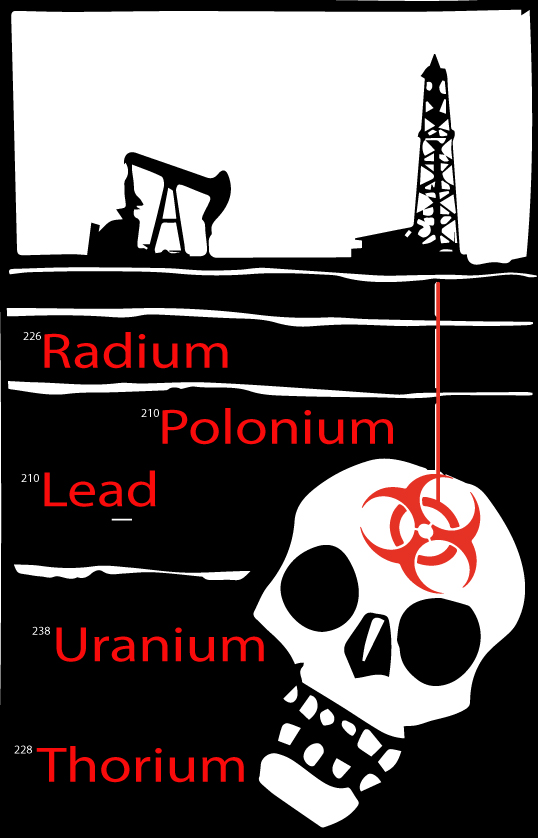
How Encana/Ovintiv gets rid of its radioactive waste, in this case at Rosebud, Alberta:
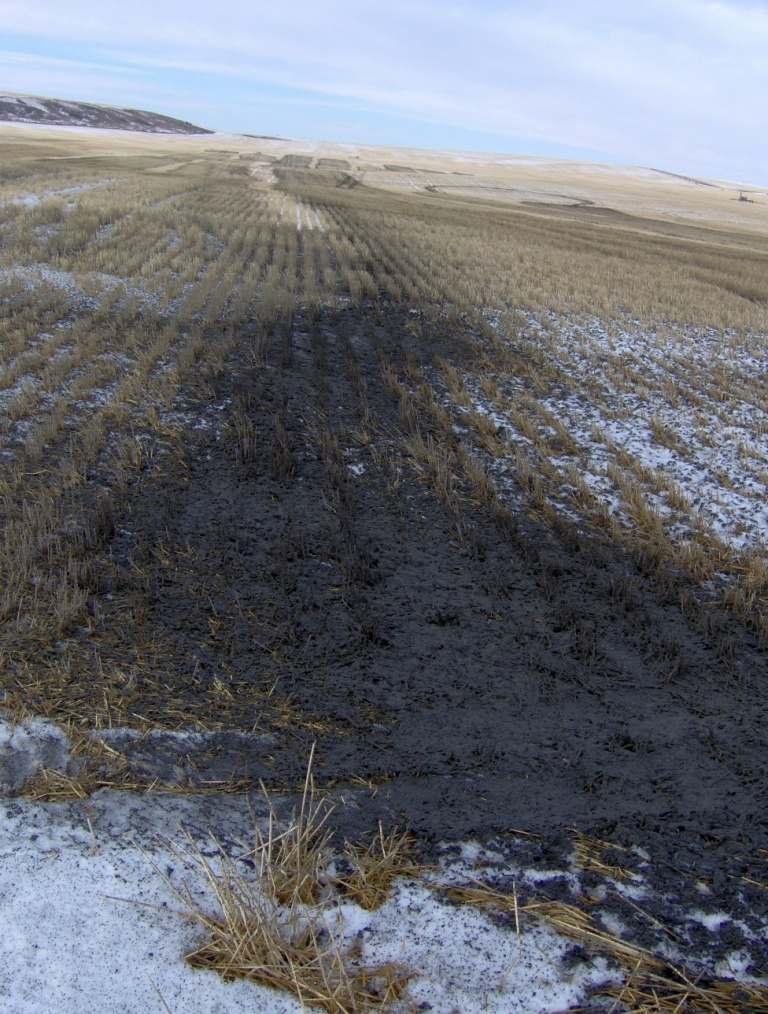
That’s a grain field Encana/Ovintiv used as its free toxic trash can, just upwind of the hamlet of Rosebud and where I live. Enjoy your toast.
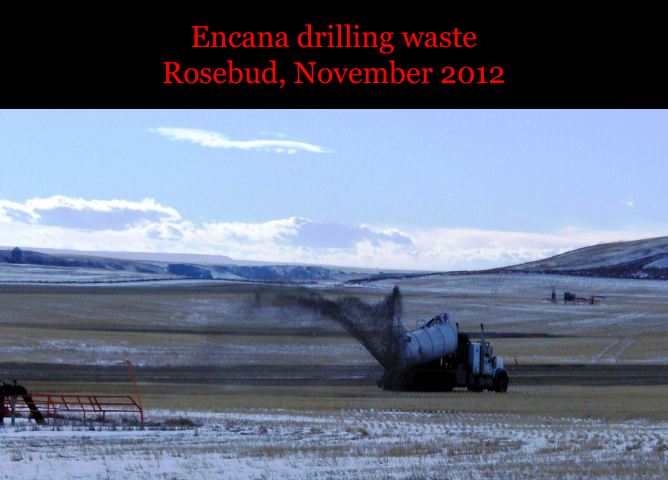
It was a very windy day, as Encana sprayed out its waste while just downwind in the hamlet of Rosebud, citizens were leaving church, breathing Encana’s waste.
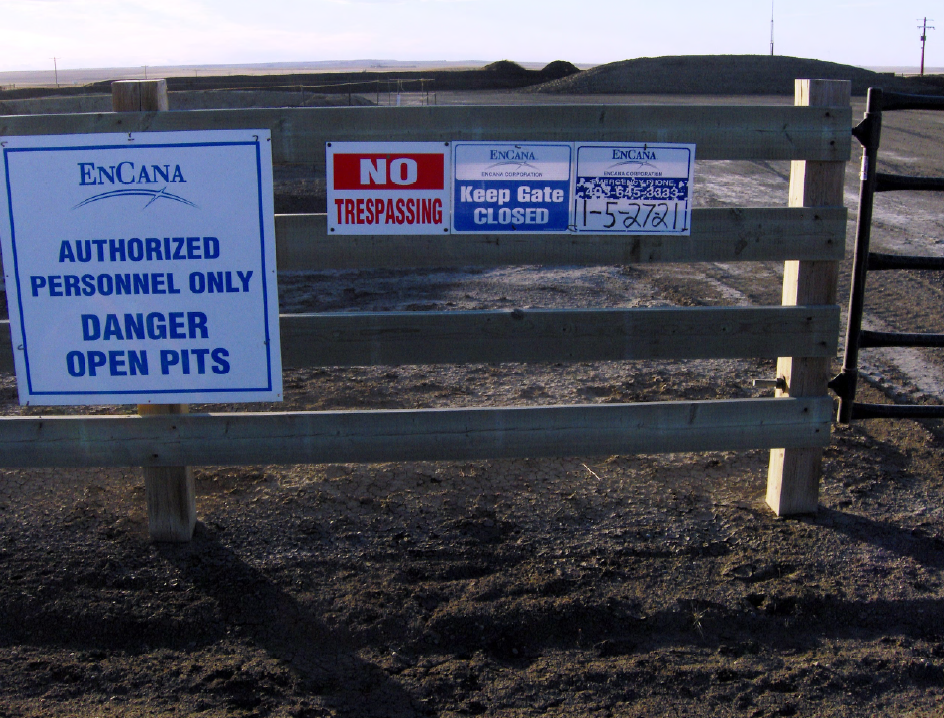
Encana/Ovintiv’s unlined pits of waste south of Rosebud, Alberta, waste nicely trickling into your baby’s bottle of formula.
Encana had such waste pits all around Rosebud, some not even fenced. When the company finished it’s rape & pillage of our community, it covered them up.
